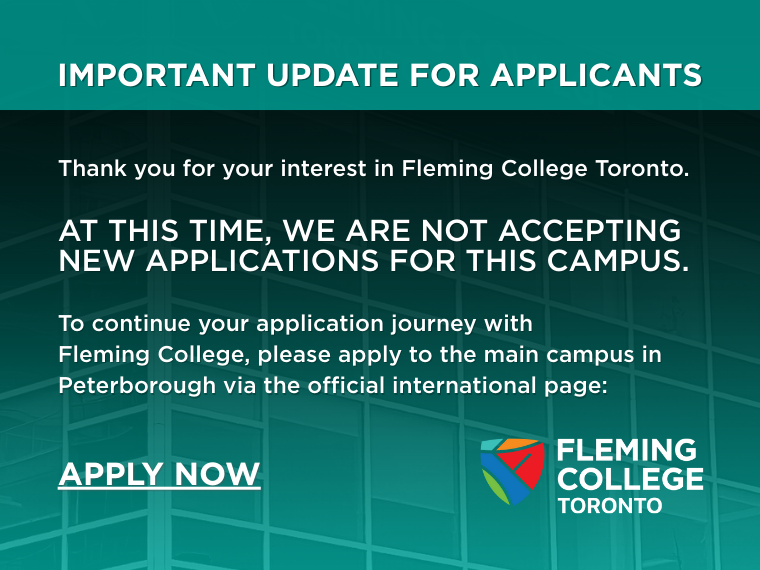In this one-year graduate certificate program, you will learn how global companies manage the flow of goods and services to maximize their competitive advantage. The skills acquired here will prepare students to work in Canada’s import and export economy, where supply chain knowledge is in high demand.
-
Program Code:
-
SCT
-
Credential:
-
Graduate Certificate
-
Duration:
-
One Year
(two semesters)
-
Start Dates:
-
Fall (September),
Winter (January),
Spring (May)

Fees
| Semesters | Semester 1 | Semester 2 |
|---|---|---|
| Tuition | $8,275.00 | $8,275.00 |
| Ancillary Fees | $1,406.49 | $491.89 |
| Health Insurance | $700.00 | N/A |
| Semester Total | $10,381.49 | $8,766.89 |
| Total Program Fees | $19,148.38 | |
*Tuition and fees subject to changes.
*Health insurance is mandatory and non-refundable.
Scholarships and Awards:
Click here to learn more about entrance scholarships and awards.
Program Highlights
-
Obtain two certificates, one Fleming Certificate of Completion and one in Freight Forwarding from the Canadian International Freight Forwarding Association (CIFFA).
-
Learn to oversee, synchronize, and manage every step of the supply chain, from raw material to consumer consumption.
-
Take a comprehensive 60-hour Customs Management course, not offered at other Ontario Colleges.
-
Understand strategic planning, resource allocation, inventory management, and more, assets to any company that wants to remain competitive on a global scale.
-
Take part in applied research projects, international case study competitions, and trade-related speaker events with professionals in Canada’s robust world of imports and exports.

Why Choose Fleming College Toronto
- Build your future business community with an international classroom and unprecedented access to Canada’s bustling business and finance capital, Toronto.
- You can expect innovative course content through traditional lectures, case studies, simulations, guest speakers, and field trips, all supported by faculty from a wide range of disciplines and industries.
- Get access to an extensive suite of support services, such as career services, academic counseling, housing and more.
- Enjoy the benefits of cosmopolitan life, including a thriving job market, cultural diversity, and networking opportunities.
Minimum Admission Requirements
Students applying to Supply Chain Management – Global Logistics must meet the following requirements:
- Undergraduate degree or minimum 2-year Ontario College diploma.
- Applicants who do not meet the requirement above and possess a combination of education and relevant experience may be considered on an individual basis.
- Successful completion of FCT ELB 6 or IELTS Academic Overall 6.5 with no band less than 6.0 or equivalent. You can check the Language Requirements page to understand other options to meet the FCT language requirement.
For more information about this program or its admission requirements, reach out to info@flemingcollegetoronto.ca.
Technology Requirements
Students are required to have their own computer, internet access, webcam and microphone. Some required software applications are not available for MAC OS or Chromebook. Computer must be virtual machine capable. No tablets or Chromebooks for lab work. For this program, the following system specifications are required:
Microsoft Computer
Operating System: Windows 10
Processor: Core i5 – 1.6 GHz
Memory: 8 GB
Hard disk: 160 GB
Apple Computer
Operating System: MacOS 10.12
Processor: Core i5 – 6th Gen
Memory: 8 GB
Hard disk: 160 GB
Internet
Download speed: 2.5 Mbps
Upload speed: 3.0 Mbps

Career Opportunities
Since many companies have a global supply chain, careers are available in a wide variety of organizations and sectors, including manufacturing, distribution, and raw material acquisition. This allows you to choose a career that best suits their interests and needs.
Some career titles include:
- Logistics Analyst
- Customs Analyst
- Customs Broker
- Purchasing Contracts Manager
- Purchasing Manager
- Supply Chain Logistics Manager
- Supply Chain Manager
Program Courses
This course explores in detail all facets of Demand Management from Sales and Operations Planning through to detailed scheduling. Students will be presented with real world situations and projects to enhance learning.
This course is focused on the functions and objectives of a logistics manager, whether operating domestically or in an international setting. Students will investigate examples of the classic cost/service trade-off that is the major challenge for all supply chain managers. The major emphasis of the course is on the utilization of strategies to add value to a company's supply chain by either reducing costs, improving efficiency or effectiveness, or improving customer service. This course will demonstrate the important role of the logistics management to companies by examining international vendors, customers and distribution centres.
This course explains key concepts in Materials Management within an organization's Supply Chain management team. It provides decision-making techniques for the replenishment of inventories with the objective of optimizing inventory levels and aligning with an organization's objectives and performance metrics.
This course is part 1 of two courses required for the CIFFA Certificate in International Freight Forwarding. It introduces the student to truck, rail, air and ocean transportation and the geography over which goods move. Incoterms 2010 rules outline the transfer of costs and risks as the goods are transported from seller to buyer teams.
This course investigates the factors of human behaviour shapes organization dynamics and culture. Students will develop knowledge about how to impact and change this behaviour to create cultures that drive international competitive advantage.
This course will provide students with a study of purchasing practices and applications in a domestic and global Supply Chain context. Students will learn an integrated approach from a management perspective that minimizes risk and contributes to overall business objectives.
This course teaches foundational skills in writing and speaking to support students in their postgraduate Business programs while also preparing them for the communication demands of the contemporary Business workplace. Working both individually and collaboratively, students learn a variety of Business workplace writing formats, including e-mails, memos, and reports. The course also covers research, APA citation and documentation, professional presentations, working in teams, and communicating across cultures.
*Course Information is subject to change without notification
Overview of Enterprise Resource Planning (ERP) using ERP software in a technology enabled database. Students operate a virtual company while using the various ERP modules in sales, marketing, accounting, purchasing, operations and human resources.
This course presents the detailed concepts of Six Sigma and Lean philosophies of Continuous Improvement. Hands on and real world activities and assignments will enhance learning.
This course is designed as a study of the movement of commercial goods into Canada. It will explore processes and documentation from the time of acquisition of product (goods) in a foreign country through to the time of delivery at the Canadian consignment area. It will include the commercial import process, customs valuation, Harmonized System of Tariff Classification, tariff treatments/trade agreements including "rules of origin", customs accounting process including duty & taxes and refund, drawback and other duty relief provisions for Canadian importers.
This course is part 2 of two courses required for the CIFFA Certificate in International Freight Forwarding. Understanding how buyers and sellers manage risk with a variety of international payment methods and cargo insurance, the knowledge of commercial documents and their completion, export packaging, cargo security, dangerous goods and alternative transport solutions enable students to properly cost and quote on a shipment.
This course is designed to prepare students for effective and productive performances in their professional life. This course will aim at further preparing students for effective and productive performance in the field.
Students learn and apply leadership and management concepts and how project managers can use them to build and foster high performance teams.
An introduction to effective project management based on PMI principles that provide students with the techniques to manage projects in the corporate and entrepreneurial environments.
*Course Information is subject to change without notification
Frequently Asked Questions (FAQs)
Please contact Fleming College Toronto to learn about your program’s delivery options.
A freight forwarder can help with supply chain optimization and logistics management by coordinating and managing the transportation of goods, ensuring efficient and timely delivery. They handle tasks like documentation, customs clearance, route planning, and choosing the appropriate transportation modes.
One year (two semesters)







